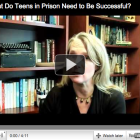
Benjamin Chambers on Reducing School Violence and Suspensions with Restorative Justice
|
The bad news: recent research indicates that schools suspend far more kids than they need to, and youth – especially youth of color, though not always -- suffer unfairly for it. The good news? Sure, zero-tolerance school discipline policies need revision. But there's another solution to the problem: changing school culture by implementing mediation and "restorative justice" techniques in schools. First, the background.








